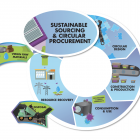As the largest city in Canada and the capital of the Ontario province, Toronto has a large population of around 6.2 million inhabitants. Toronto is the economic heart of Canada and leading city for a wide range of sectors such as finance, telecommunications, media, software development and medical science. Its conscious environmental attitude, diverse population and high level of prosperity attracts people from all over the world meaning it has a high immigrant population.
In 2016, Toronto Region Board of Trade (TRBOT) jointly formed a Smart Cities Working Group (SCWG) with the City of Toronto which consisted of over 50 members. The SCWG successfully lead three annual Smart City Summits from 2016-18 and released SCWG Smart City report, ‘Choices for a Smarter Toronto: A Call for Collaborative Action’ focusing on five key areas; collaborate, catalyse, connect, co-create and communicate.
Toronto have started many smart city initiatives – in 2017 and 2018 they participated in the Canadian Federal Smart Cities Challenge which was designed to encourage the development of innovative solutions to urban challenges in partnership with municipal leaders, organisations and non-profit and academic partners. Despite proposing a project that demonstrated Toronto’s strength as a centre for innovation and connected technology, they did not secure a grant meaning no final strategy was developed. The year 2017 also saw Toronto review its Internet Connectivity, focusing on an access and affordability lens for citizens, businesses and visitors the report found affordability a key issue.
Toronto also launched an initiative called the Quayside project which was run by Side Labs Toronto. Toronto’s eastern waterfront was the designated spot for the development of a global model of inclusive urban growth. The Master Innovation and Development Plan (MIDP) was set out as a project proposal which aimed at creating 44,000 jobs and $14.2 billion in annual economic impact by 2040. The project emphasised the need for climate positivity - aiming to reduce 89% of greenhouse gases in the district – focused on mobility in terms of housing and transport and urban innovation. Whilst it was announced in May 2020 that unfortunately the Sidewalk Toronto project was no longer moving forward, a great deal of resources are still available and invaluable lessons have been learnt in what makes a good, viable smart city. With a great deal of experience and insight, Toronto shall offer its guidance as an ICC mentor.
How to join ICC?
The application period for the ICC 2023-25 edition is now closed. However, if your city is still interested in getting involved with the ICC programme, please contact the Intelligent Cities Helpdesk (helpdesk_icc@technopolis-group.com) to explore the possible options.







